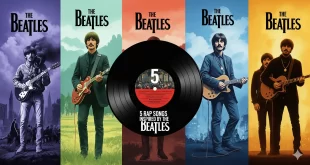In the mid-1960s, as Beatlemania swept across the globe, it seemed like no country could resist the charm, energy, and cultural force of The Beatles. From Australia to New Zealand, from Europe to Asia, the Fab Four’s tours generated record-breaking crowds, economic booms, and a cultural shift that defined an era.
Yet one country stood apart — and not in the way fans might expect. Israel, a young nation still shaping its cultural and political identity, made the controversial decision to ban The Beatles from performing within its borders.
The Moral Panic Behind the Ban
The ban came at a time when Israel’s authorities were wary of Western cultural influences. In 1964, the Israeli Interdepartmental Committee for Authorising the Importation of Foreign Artists — a 13-member body tasked with deciding which foreign acts could perform — unanimously rejected the idea of hosting The Beatles.
Their reasoning was blunt: Beatlemania was seen as a dangerous force capable of “negatively influencing the youth.” The official resolution even stated:
“Resolved: Not to allow the request for fear that the performances by the Beatles are liable to have a negative influence on the youth.”
Education Minister Hanoch Rinot went further, dismissing the group’s artistry and calling their shows a “sensual display” that stirred “feelings of aggression replete with sexual stimuli.”
Earlier Attempts and Missed Opportunities
Negotiations to bring “The Rhythm Beatles” (as they were known in Hebrew) to Israel began as early as 1962. Prominent Israeli promoters Giora Godik and Yaakov Uri were approached by the mother of Beatles manager Brian Epstein, who offered the band a spot in Israel on an upcoming tour.
However, Godik declined — opting instead to bring Cliff Richard and The Shadows. This decision, often cited as one of the worst in Israeli music history, not only deprived the country of a cultural milestone but also created tension between Godik and Uri. Godik later lobbied the Israeli Finance Committee to block The Beatles entirely.
Political and Financial Barriers
At the time, Israel had strict regulations on foreign currency usage, and any major cultural event involving significant foreign payments required government approval. Officials doubted whether the promoters could fund the concert, adding another obstacle. Even without the moral panic, the concert might have been cancelled on financial grounds.
A Change of Tune — Decades Later
It wasn’t until 2008 that Israel formally apologized. The country’s ambassador to the UK, Ron Prosor, delivered a letter to John Lennon’s half-sister, Julia Baird, acknowledging that the ban had been a mistake.
By then, the surviving Beatles had long moved on to solo careers. Paul McCartney finally performed in Tel Aviv in September 2008, and Ringo Starr brought his All-Starr Band to Israel for two concerts in 2018.
The Modern Controversy
In recent years, the decision for artists to perform in Israel has become politically charged again — this time due to the global backlash against the country’s treatment of Palestinians. Several major acts have cancelled concerts, echoing the cultural boycotts of past decades.
Tel Aviv University history professor Alon Gan summed up the original fear behind the ban:
“Israel in the early ’60s was afraid that from the West would come a bad wind of sex, alcohol, and rock ‘n’ roll.”
Today, that fear is part of music history — a reminder of how even the most celebrated bands can find themselves at the center of cultural and political storms.






